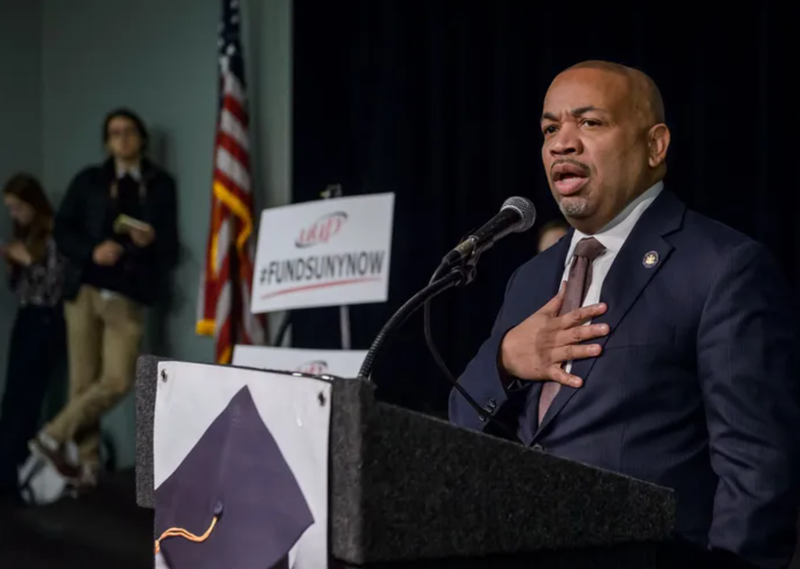
ALBANY, N.Y. (1010 WINS) -- After refusing to bring a landmark climate bill to a vote on the last day of the legislative session despite widespread support, Assembly Speaker Carl Heastie announced he intends to hold a hearing on the bill July 28 while the legislature is out of session.

Heastie says he wants the hearings to examine “capacity needed to meet goals, potential costs of needed infrastructure, impacts on consumers and taxpayers, acquisition costs, and siting and eminent domain criteria.”
Members of the public and special interest groups will be able to submit testimony for the hearing.
After facing backlash for refusing to bring the Build Public Renewables Act to a vote, Heastie denied there was enough support in the Assembly to pass it.
“We agree with the goals of the Build Public Renewables Act,” said Heastie. “The final version of the bill — amended two days prior to the scheduled close of our legislative session — had support in our conference, but not enough to move forward at this point.”
Public Power New York, a group that advocates for the bill, claimed 83 members of the 151-member body confirmed their support for the BPRA before the end of the session.
Advocates are calling for Gov. Kathy Hochul to call a special legislative session in order to pass the bill following the hearing.
Legislative hearings outside of session are not unheard of, and neither are special sessions in times of crisis.
Hochul most recently held a special session in September to vote on extending the pandemic eviction moratorium.
Heastie’s office refused to say whether the speaker would support a special legislative session. Gov. Hochul’s office did not immediately respond to 1010 WINS’ request for comment.
Aaron Eisenberg, an organizer for PPNY, said he thinks Heastie is backpedaling after realizing the BPRA had more public support than he anticipated.
“The Build public renewables act has really hit a nerve at a time when people are looking away from the federal government and looking to states and cities to lead,” said Eisenberg. “When New York is at 4% wind and solar, that’s not doing enough. And I think Carl Heastie really felt pressured at this point and recognized there was support for this bill.”
The speaker pointed to other climate legislation that passed during the 2022 session as evidence of his commitment to environmental policy.
“This session alone we took the lead on passing a new Environmental Quality Bond Act, enacting a landmark first-in-the-nation crypto mining moratorium at fossil fuel plants in New York, putting in place new appliance efficiency standards, passing legislation to preserve 30 percent of New York's land and water, and banning the use of harmful pesticides,” said Heastie. “These bills and many others build on the Assembly's long and proud tradition of working to protect our environment and recognizing the challenges to our climate.”
A 2019 law established a goal of generating 100% of New York’s power from zero-emission sources by 2040.
Despite having a supermajority in both houses of the state legislature for the past few years, Democrats have failed to pass any legislation in pursuit of that goal.
The BPRA would empower the New York Power Authority, which currently operates only three major clean energy facilities, to build renewable power infrastructure and replace existing polluting power plants with green alternatives.
The bill would mandate NYPA conduct annual reviews of the state’s trajectory toward meeting its climate goals and correct course when necessary.
That would allow private energy providers to opt into building green infrastructure and allow NYPA to step in and pick up the slack if they fail.
The bill would also expand a program that offers discounted state power for small businesses to low and middle income households.
Eisenberg, who also organizes for the Democratic Socialists of America, says he’s focused on getting the DSA’s slate of climate-focused candidates elected in order to pressure Democrats to take environmental issues seriously.
He wants the threat of primary challengers to motivate sitting Democrats to be more proactive about climate issues. He sees failure to support the BPRA as exactly the kind of issue that could inspire climate activists to organize around primarying an elected official.
“Whose side are you on?” said Eisenberg. “Are you on the side of renewable energy developers who are trying to exploit this transition for their own profit, or are you on the side of every single person in New York State trying to have a livable future?”


